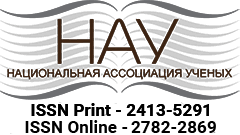IMPROVING THE ECONOMIC EFFICIENCY OF AGRICULTURAL ENTERPRISES (62-64)
Номер части:
Оглавление
Содержание
Журнал
Выходные данные
Дата публикации статьи в журнале:
2020/11/09
Название журнала:Национальная Ассоциация Ученых,
Выпуск:
60,
Том: 1,
Страницы в выпуске:
62-64
Автор:
Abdikerimova G. I.
candidate of economic Sciences, associate Professor ,
candidate of economic Sciences, associate Professor ,
Автор:
Madi M.S.
Master's student, South Kazakhstan University named after M. Auezov, Shymkent city
Master's student, South Kazakhstan University named after M. Auezov, Shymkent city
Анотация: As the results of the activities of agricultural enterprises in recent years show, the level of efficiency of agricultural production in most of them remains low and does not provide expanded reproduction.
The financial situation of the agricultural sector remains extremely unstable. a significant number of enterprises are insolvent and do not have their own resources for normal economic activity and the use of scientific and technological progress.
In this regard, there is a need to clarify methodological approaches to determining the nature and system of factors that affect the efficiency of agricultural organizations, as well as indicators that characterize its level, and develop proposals for improving the financial and economic mechanism of management and organization of the reproduction process.
Ключевые слова:
agricultural enterprises;
efficiency; methodology; improvement;
Данные для цитирования: Madi M.S. . IMPROVING THE ECONOMIC EFFICIENCY OF AGRICULTURAL ENTERPRISES (62-64). Национальная Ассоциация Ученых.
Проблемы Экономических наук. 2020/11/09;
60(1):62-64
- PDF версия
- Текстовая версия
Скачать в формате PDF
Список литературы: 1. Шафронов А. Факторы роста эффективности и устойчивости сельскохозяйственных предприятий. // АПК: экономика, управление, 2015, №1.
2. Макин Г.И. Выявление эффективности управления в аграрном секторе. // Экономика сельскохозяйственных и перерабатывающих предприятий, 2016, №1.
3. Кожевина О.В. Проблемы и перспективы банкротства предприятия АПК в свете нового закона о несостоятельности. // Экономика сельскохозяйственных и перерабатывающих предприятий, 2017, №7.
4. Догиль Л.Ф. Хозяйственный риск и финансовая устойчивость предприятий АПК. Методологические и практические аспекты. -Мн.: БГЭУ, 2014.
5. Арефьев В.И. Организационноэкономические предпосылки развития кооперации в сельском хозяйстве: Материалы международной научной конференции. М. - Смоленск - Горки - Шецин, 2013. - С. 149-154.
